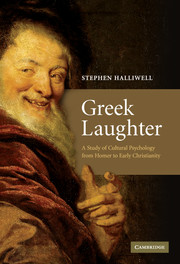Book contents
- Frontmatter
- Contents
- Preface
- Note to the reader
- Abbreviations
- 1 Introduction: Greek laughter in theory and practice
- 2 Inside and outside morality: the laughter of Homeric gods and men
- 3 Sympotic elation and resistance to death
- 4 Ritual laughter and the renewal of life
- 5 Aischrology, shame and Old Comedy
- 6 Greek philosophy and the ethics of ridicule
- 7 Greek laughter and the problem of the absurd
- 8 The intermittencies of laughter in Menander's social world
- 9 Lucian and the laughter of life and death
- 10 Laughter denied, laughter deferred: the antigelastic tendencies of early Christianity
- Appendix 1 The Greek (body) language of laughter and smiles
- Appendix 2 Gelastic faces in visual art
- Bibliography
- Index of selected authors and works
- Index of selected Greek terms
- General index
5 - Aischrology, shame and Old Comedy
Published online by Cambridge University Press: 22 September 2009
- Frontmatter
- Contents
- Preface
- Note to the reader
- Abbreviations
- 1 Introduction: Greek laughter in theory and practice
- 2 Inside and outside morality: the laughter of Homeric gods and men
- 3 Sympotic elation and resistance to death
- 4 Ritual laughter and the renewal of life
- 5 Aischrology, shame and Old Comedy
- 6 Greek philosophy and the ethics of ridicule
- 7 Greek laughter and the problem of the absurd
- 8 The intermittencies of laughter in Menander's social world
- 9 Lucian and the laughter of life and death
- 10 Laughter denied, laughter deferred: the antigelastic tendencies of early Christianity
- Appendix 1 The Greek (body) language of laughter and smiles
- Appendix 2 Gelastic faces in visual art
- Bibliography
- Index of selected authors and works
- Index of selected Greek terms
- General index
Summary
vladimir Ceremonious ape!
estragon Punctilious pig!
vladimir Finish your phrase, I tell you!
Estragon Finish your own!
[Silence. They draw closer, halt.]vladimir Moron!
estragon That's the idea, let's abuse each other.
Samuel Beckett, Waiting for GodotWHO IS SHAMED BY SHAMEFUL SPEECH
The ritualised performances investigated in the previous chapter are characterised not only by a general association with the symbolic arousal of laughter, but also by a marked tendency towards the use of aischrologia, ‘shameful’ or offensive speech. In sacred contexts, such aischrology is a pointedly paradoxical transgression of the normal religious requirement of euphēmia (auspicious, pure speech, often equated with ‘silence’). But at the same time it is observably framed and protected by the ritual setting itself, and thereby converted into a function of the worship and celebration of a deity. However difficult it may be for us to recover the authentic mentality of those who participated in such events, we can see that ritual aischrology, together with the laughter which typically accompanies it, is controlled and made somehow acceptable by its inclusion within a culturally codified set of protocols. Outside such frameworks, by contrast, aischrologic behaviour takes on the appearance of an intrinsically shameful, aggressive and destabilising phenomenon, a threat to communal necessities of restraint, cooperation and order. In the common flow of social life, moreover, aischrology seems to possess a sort of doubleness in relation to the workings of shame.
- Type
- Chapter
- Information
- Greek LaughterA Study of Cultural Psychology from Homer to Early Christianity, pp. 215 - 263Publisher: Cambridge University PressPrint publication year: 2008
- 1
- Cited by

